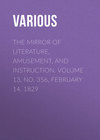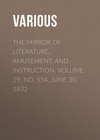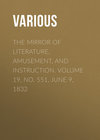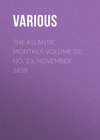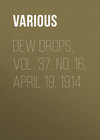Loe raamatut: «The Mirror of Literature, Amusement, and Instruction. Volume 13, No. 356, February 14, 1829», lehekülg 5
THE JOHN DORY
In the 312th Number of the Mirror, several solutions are given of the name of a well-known and high-priced fish, the John Dory, or Jaune Dorée. Sir Joseph Banks's observation, that it should be spelled and acknowledged "adorée," because it is the most valuable (or worshipful) of fish, as requiring no sauce, is equally absurd and unwarranted; for so far from its being incapable of improvement from such adjuncts, its relish is materially augmented by any one of the three most usual side tureens. The dory attains its fullest growth in the Adriatic, and is a favourite dish in Venice, where, as in all the Italian ports of the Mediterranean, it is called Janitore, or the gate-keeper, by which title St. Peter is most commonly designated among the Catholics, as being the reputed keeper of the keys of heaven. In this respect, the name tallies with the superstitious legend of this being the fish out of whose mouth the apostle took the tribute money. The breast of the animal is very much flattened, as if it had been compressed; but, unfortunately for the credit of the monks, this feature is exhibited in equally strong lineaments by, at least, twenty other varieties of the finny tribe.
Our sailors naturally substituted the appellation of John Dory for the Italian Janitore, and a very high price is sometimes given for this fish when in prime condition, as I can testify from experience; having two years since seen one at Ramsgate which was sold early in the day for eighteen shillings.
JOHNNY RAW
THE SELECTOR, AND LITERARY NOTICES OF NEW WORKS
"Anecdotes correspond in literature with the sauces, the savoury dishes, and the sweetmeats of a splendid banquet;" and as our weekly sheet is a sort of literary fricassee, the following may not be unacceptable to the reader. They are penciled from a work quaintly enough entitled "The Living and the Dead, by a Country Curate;" and equally strange, the cognomen of the author is not a ruse—he being a curate at Liverpool, the son of Dr. Adam Neale, and a nephew of the late Mr. Archibald Constable, the eminent publisher, of Edinburgh. The information which this volume contains, may therefore be received with greater confidence than is usually attached to flying anecdotes; since Mr. Constable's frequent and familiar intercourse with the first literary characters of his time must have given him peculiar facilities of observation of their personal habits. The present volume of "The Living and the Dead" is what the publisher terms the Second Series; for, like Buck, the turncoat actor, booksellers always think that one good turn deserves another. Our first extracts relate to Chantrey's monument in Lichfield Cathedral, and another of rival celebrity.
At the retired church of Ashbourne is "a remarkable monument", by Banks, to the memory of a very lovely and intelligent little girl, a baronet's only child. It bears an inscription which, to use the mildest term, as it contains not the slightest reference to Christian hopes, should have been refused admittance within a Christian church. To the sentiments it breathes, Paine himself, had he been alive, could have raised no objection. * * * * The figure, which is recumbent, is that of a little girl; the attitude exquisitely natural and graceful. It recalls most forcibly to the recollection Chantrey's far-famed monument in Lichfield Cathedral; for the resemblance, both in design and execution, between these beautiful specimens of art is close and striking.
Previous to his executing that most magnificent yet most touching piece of sculpture, which alone would have sufficed to immortalize his name, Chantrey was, at his own request, locked up alone in the church for two hours. This fact may be apocryphal; but the following I do affirm most confidently. When I hinted to the venerable matron who shows the monument, and who, being a retainer of the Boothby family, feels their honour identified with her own, that Chantrey's was by far the finer effort of the two, and that I wished I had that yet to see; and my companion added, that though the design of the Boothby monument was good, the execution was coarse and clumsy in the extreme, compared with the elaborate finish of the Robinson's. "Humph," said the old lady, with a most vinegar expression of countenance, with a degree of angry hauteur, an air of insulted dignity that Yates would have travelled fifty miles to witness; "the like of that's what I now hear every day. Hang that fellow Chantee, or Cantee, or what you call him; I wish he had never been born!" The Ashbourne people are naturally proud of the monument. With them it is a kind of idol, to which every stranger is required to do homage. Among others, when Prince Leopold passed through Ashbourne, and inquiries were made by some of his royal highness's suite as to the "lions" of the neighbourhood—"We have one of our own, Sir," was the ready reply; "a noble piece of sculpture in the church." To the church the royal mourner was on the very point of repairing, when Sir Robert Gardiner suddenly inquired the description to which the sculpture in question belonged. "It is a monument, Sir, no one passes through without seeing it; for its like is not to be met with in England—it is a monument to an only child, whose mother died—" "Not now," said the prince faintly; "not now. I too have lost—" and he turned away from the carriage in tears.
MR. CANNING
It may be observed, too, by the way, that to Ashbourne the late Mr. Canning was remarkably partial. Near it lived a female relative to whom he was warmly attached, and under whose roof many of his happiest hours were spent. It is stated, that a little poem, entitled, "A Spring Morning in Dovedale," one of the earliest efforts of his muse, is still in existence; and I have good reasons for knowing, that but a very few weeks previous to his death, he stated, in conversation, what delight he should feel in "going into that neighbourhood, and revisiting haunts which to him had been scenes of almost unalloyed enjoyment." I could scarcely believe, so exquisitely tranquil is the scene, the very murmur of the stream which flows around seems to soften itself in unison with the stillness of the landscape—that Ashbourne had ever been other than the abode of rural peace and comfort; and yet I was assured that during the war there was scarcely any limit to the bustle and gaiety which pervaded it.
MR. MOORE, THE POET
At Mayfield, near Ashbourne, is a cottage where Moore, it is stated, composed Lalla Rookh. "For some years this distinguished poet lived at the neighbouring village of Mayfield; and there was no end to the pleasantries and anecdotes that were floating about its coteries respecting him; no limit to the recollections which existed of the peculiarities of the poet, of the wit and drollery of the man. Go where you would, his literary relics were pointed out to you. One family possessed pens; and oh! Mr. Bramah! such pens! they would have borne a comparison with Miss Mitford's; and those who are acquainted with that lady's literary implements and accessaries will admit this is no common-place praise—pens that wrote "Paradise and the Peri" in Lalia Rookh! Another showed you a glove torn up into thin shreds in the most even and regular manner possible; each shred being in breadth about the eighth of an inch, and the work of the teeth! Pairs were demolished in this way during the progress of the Life of Sheridan. A third called your attention to a note written in a strain of the most playful banter, and announcing the next "tragi-comedy meeting." A fourth repeated a merry impromptu; and a fifth played a very pathetic air, composed and adapted for some beautiful lines of Mrs. Opie's. But to return to Mayfield. Our desire to go over the cottage which he had inhabited was irresistible. It is neat, but very small, and remarkable for nothing except combining a most sheltered situation with the most extensive prospect. Still one had pleasure in going over it, and peeping into the little book-room, ycleped the "Poet's Den," from which so much true poetry had issued to delight and amuse mankind. But our satisfaction was not without its portion of alloy. As we approached the cottage, a figure scarcely human appeared at one of the windows. Unaware that it was again inhabited, we hesitated about entering; when a livid, half-starved visage presented itself through the lattice, and a thin, shrill voice discordantly ejaculated,—"Come in, gentlemen, come in. Don't be afeard! I'm only a tailor at work on the premises." This villanous salutation damped sadly the illusion of the scene; and it was some time before we rallied sufficiently from this horrible desecration to descend to the poet's walk in the shrubbery, where, pacing up and down the live-long morning, he composed his Lalla Rookh. It is a little confined gravel-walk, in length about twenty paces; so narrow, that there is barely room on it for two persons to walk abreast: bounded on one side by a straggling row of stinted laurels, on the other by some old decayed wooden paling; at the end of it was a huge haystack. Here, without prospect, space, fields, flowers, or natural beauties of any description, was that most imaginative poem conceived, planned, and executed. It was at Mayfield, too, that those bitter stanzas were written on the death of Sheridan. There is a curious circumstance connected with them; they were sent to Perry, the well-known editor of the Morning Chronicle. Perry, though no stickler in a general way, was staggered at the venom of two stanzas, to which I need not more particularly allude, and wrote to inquire whether he might be permitted to omit them. The reply which he received was shortly this: "You may insert the lines in the Chronicle or not, as you please; I am perfectly indifferent about it; but if you do insert them, it must be verbatim." Mr. Moore's fame would not have suffered by their suppression; his heart would have been a gainer. Some of his happiest efforts are connected with the localities of Ashbourne. The beautiful lines beginning
"Those evening bells, those evening bells,"
were suggested, it is said, by hearing the Ashboume peal; and sweetly indeed do they sound at that distance, "both mournfully and slow;" while those exquisitely touching stanzas,
"Weep not for those whom the veil of the tomb
In life's happy morning hath hid from our eyes,"
were avowedly written on the sister of an Ashbourne gentleman, Mr. P– B–. But to his drolleries. He avowed on all occasions an utter horror of ugly women. He was heard, one evening, to observe to a lady, whose person was pre-eminently plain, but who, nevertheless, had been anxiously doing her little endeavours to attract his attention, "I cannot endure an ugly woman. I'm sure I could never live with one. A man that marries an ugly woman cannot be happy." The lady observed, that "such an observation she could not permit to pass without remark. She knew many plain couples who lived most happily."—"Don't talk of it," said the wit; "don't talk of it. It cannot be."—"But I tell you," said the lady, who became all at once both piqued and positive, "it can be, and it is. I will name individuals so circumstanced. You have heard of Colonel and Mrs. –. She speaks in a deep, gruff bass voice; he in a thin, shrill treble. She looks like a Jean Dorée; he like a dried alligator. They are called Bubble and Squeak by some of their neighbours; Venus and Adonis by others. But what of that? They are not handsome, to be sure; and there is neither mirror nor pier-glass to be found, search their house from one end of it to the other. But what of that? No unhandsome reflections can, in such a case, be cast by either party! I know them well; and a more harmonious couple I never met with. Now, Mr. Moore, in reply, what have you to say? I flatter myself I have overthrown your theory completely." "Not a whit. Colonel—has got into a scrape, and, like a soldier, puts the best face he can upon it." Those still exist who were witnesses to his exultation when one morning he entered Mrs–'s drawing-room, with an open letter in his hand, and, in his peculiarly joyous and animated manner, exclaimed, "Don't be surprised if I play all sorts of antics! I am like a child with a new rattle! Here is a letter from my friend Lord Byron, telling me he has dedicated to me his poem of the 'Corsair.' Ah, Mrs.–, it is nothing new for a poor poet to dedicate his poem to a great lord; but it is something passing strange for a great lord to dedicate his book to a poor poet." Those who know him most intimately feel no sort of hesitation in declaring, that he has again and again been heard to express regret at the earlier efforts of his muse; or reluctance in stating, at the same time, as a fact, that Mr. M., on two different occasions, endeavoured to repurchase the copyright of certain poems; but, in each instance, the sum demanded was so exorbitant, as of itself to put an end to the negotiation. The attempt, however, does him honour. And, affectionate father as he is well known to be, when he looks at his beautiful little daughter, and those fears, and hopes, and cares, and anxieties, come over him which almost choke a parent's utterance as he gazes on a promising and idolized child, he will own the censures passed on those poems to be just: nay more—every year will find him more and more sensible of the paramount importance of the union of female purity with female loveliness—more alive to the imperative duty, on a father's part, to guard the maiden bosom from the slightest taint of licentiousness. It is a fact not generally suspected, though his last work, "The Epicurean," affords strong internal evidence of the truth of the observation, that few are more thoroughly conversant with Scripture than himself. Many of Alethe's most beautiful remarks are simple paraphrases of the sacred volume. He has been heard to quote from it with the happiest effect—to say there was no book like it—no book, regarding it as a mere human composition, which could on any subject even "approach it in poetry, beauty, pathos, and sublimity." Long may these sentiments abide in him! And as no man, to use his own words, "ever had fiercer enemies or firmer friends"—as no man, to use those of others, was ever more bitter and sarcastic as a political enemy, more affectionate and devoted as a private friend, the more deeply his future writings are impregnated with the spirit of that volume, the more heartfelt, let him be well assured, will be his gratification in that hour when "we shall think of those we love, only to regret that we have not loved more dearly, when we shall remember our enemies only to forgive them."
